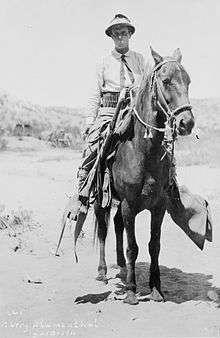Giuseppe Garibaldi II
| Giuseppe Garibaldi II | |
|---|---|
 Giuseppe Garibaldi II in Mexico, 1911 | |
| Nickname(s) | Peppino Garibaldi |
| Born |
29 July 1879 Melbourne, Australia |
| Died |
19 May 1950 (aged 70) Rome, Italy |
| Allegiance |
|
| Service/branch | French Foreign Legion - Garibaldi Legion |
| Rank | Brigadier-general |
| Commands held | Commander of Garibaldi Legion |
| Battles/wars |
|
| Spouse(s) | Madalyn Nichols Taylor |
| Relations |
|
Brigadier-General Giuseppe Garibaldi II (July 29, 1879 – May 19, 1950), better known as Peppino, was an Italian soldier, patriot and revolutionary, grandson of Giuseppe Garibaldi.
Biography
Garibaldi was born in Melbourne, Australia, the son of Ricciotti Garibaldi and Harriet Constance Hopcraft.[1]
Together with his father, he took part in the Greco-Turkish War of 1897 alongside the Greeks and afterwards fought with the liberals against Cipriano Castro in Venezuela, and in other conflicts in South America. He volunteered and served with great distinction in the British Army during the Second Boer War, carrying with him a sword given to his grandfather by the working men of Tyneside, England, in 1854.[2]
He served as a lieutenant colonel (teniente coronel) in the army of Francisco I. Madero during the initial victories of the 1910 Mexican Revolution. Plaza Garibaldi in Mexico City was named in honor of his actions in the battle of Nuevo Casas Grandes. Pancho Villa sacked Lt Col Garibaldi because of a bitter controversy over the credit for the victory at first battle of Ciudad Juárez in 1911, but the name of the plaza (formerly Pila de la Habana) stuck nonetheless, despite the way he left the Army of the Revolution.
Garibaldi again served with the Greek Army during the First Balkan War in 1912.
At the outbreak of World War I, Garibaldi joined the French army at the head of the 4e régiment de marche du 1er étranger[3] and later fought on the Italian front for Italy. In November 1915 his unit was the one that planted the Italian flag on the summit of Col di Lana. For this he received a promotion to colonel.[4] He was promoted to brigadier-general in June, 1918, retiring from the military one year later.
Garibaldi opposed the National Fascist Party régime of Benito Mussolini which came to power in 1922 (while his younger brother Ezio favored it). He eventually left Italy for the United States, where he married Madalyn Nichols Taylor. In 1940 he returned to Italy, where in 1943 the German authorities arrested and imprisoned him in the Regina Coeli prison in Rome. After the war he retired to private life.
He died in Rome in 1950, aged 70.
Bibliography
- Notes
- ↑ Heyriès 2005, p. 32
- ↑ Bell 2001
- ↑ Heyriès 2005, p. 63
- ↑ The Ogden Standard 1915, p. 1
- References
- Bell, David (2001). Ships, Strikes and Keelmen. TUPS. ISBN 9781901237269.
- Heyriès, Hubert (2005). Les Garibaldiens de 14: splendeurs et misères des chemises rouges en France de la grande guerre à la seconde guerre mondiale (in French). SERRE EDITEUR. ISBN 9782864104384. - Total pages: 672
- The Ogden Standard (November 12, 1915). "Peppino Garibaldi promoted". The Ogden standard. ISSN 2163-4793. OCLC 12982876. Archived from the original on November 12, 1915. Retrieved January 6, 2015.
External links
- "Italy: Garibaldi's Conversion". Time. April 15, 1940.
-
 "Garibaldi, Giuseppe". Encyclopædia Britannica (12th ed.). 1922.
"Garibaldi, Giuseppe". Encyclopædia Britannica (12th ed.). 1922.